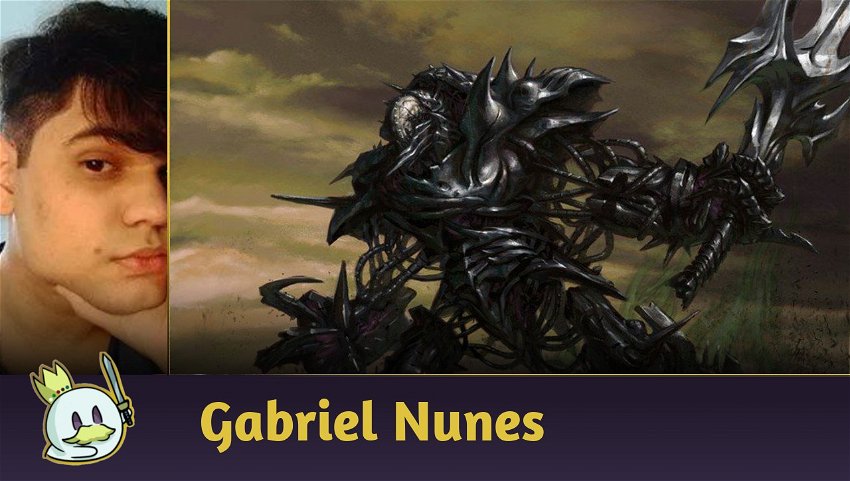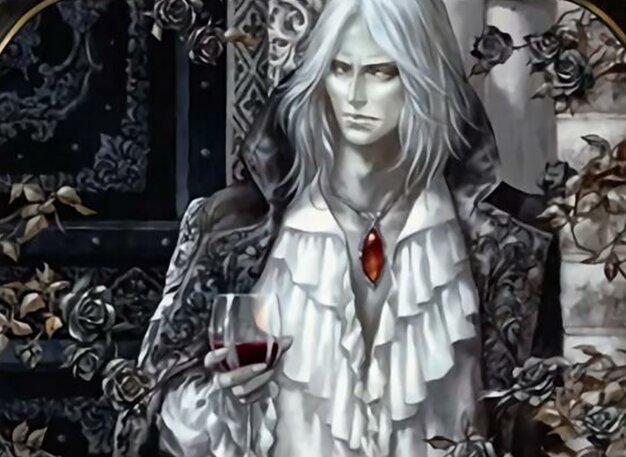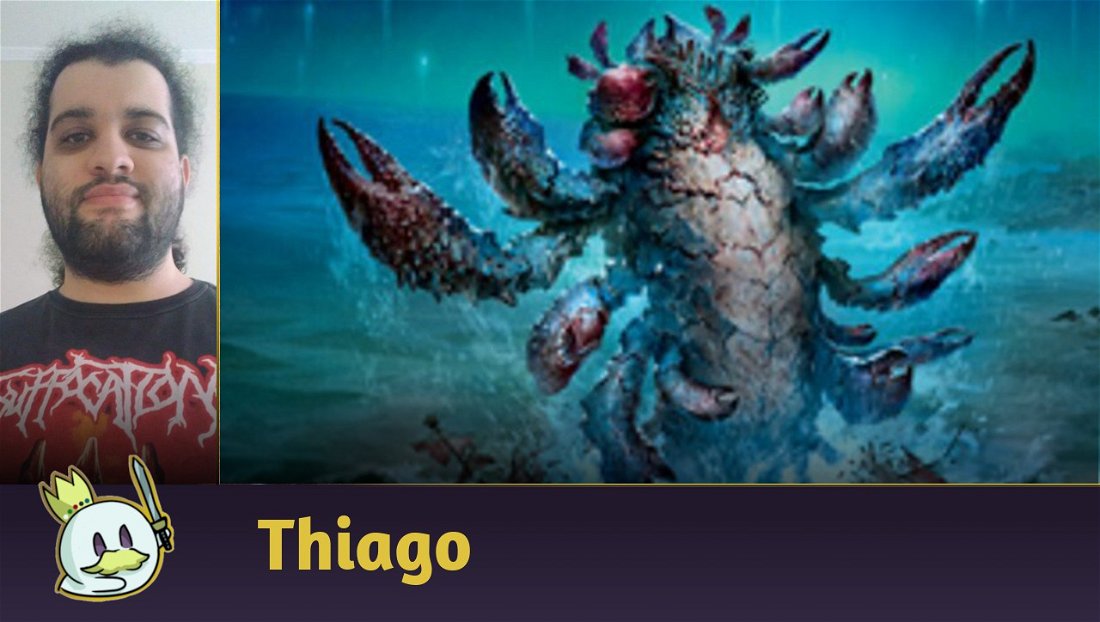Hello everyone!
MTG Vegas was an Open event along the lines of the late MagicFests (or even more late Grand Prix) that received thousands of players in Las Vegas with a heavy cash prize pool, and obviously this return to the game in its more classic version is something at least relevant. So, let's analyze the Top 8 decks in the Swiss order(which brought very interesting lists) and some more details of the event's environment!
8th Place - Steven Pearman - Four-Color Creativity
Let's start with the combo!
Ad
This deck that started to fall into hype since the Velomachus Lorehold was released, appears here in a version without the Boros dragon, which ended up falling into disuse because it needed one more setup of extra turns. Here, Pearlman has come up with Emrakul, the Aeons Torn and Serra's Emissary to be brought in by Indomitable Creativity, two intriguing options that don't win the game on their turn but are resilient and hard to interact with.
Emrakul is hard to get out of the field and once she manages to attack, her annihilator 6 will be devastating (in addition to being a 15/15 flying attacker), as the Emissary brings protection for both her and everything on your side of the board.. And, specially, for you.

Generally speaking, the list is the most up-to-date standard version of the deck, which combines disruptions (such as Lightning Bolt, Remand and Prismatic Ending), card advantage pieces (such as Prismari Command and Faithful Mending) and useful Planeswalkers (Nahiri, the Harbinger, Teferi, Time Raveler, Wrenn and Six and Jace, the Mind Sculptor).
The great strength of the deck is the synergy of these pieces with the combo, Teferi preventing the opponent from interacting, Nahiri working as an alternative way to bring our winconditions into play, Prismari Command creating tokens to enable targets for Indomitable Creativity, as well as several interactions that draw cards to dig the necessary pieces, such as Remand and Fire//Ice. All pieces end up fitting into this combo while adding multiple control elements.
7th Place - Ivan Espinosa - Four-Color Omnath Control
Yes, we have another four-color deck here, but much more geared towards good stuff, bringing large pieces with individual value that can carry games, as well as removals and counterspells that bring a control aspect to the deck.

While this deck doesn't have all the interactions that 5c Elementals do, it's clear how important they are to the deck, with a huge focus on Omnath, Locus of Creation, which generates a lot of value on its own in addition to serving as an alternative cost for all pitch spells in the deck, as it has all the colors we run.
Speaking of pitch spells, we have the rest of our elemental package: Fury and Solitude, which serve very well at the beginning of the game as a disruption and at the end of the game as a wincondition.
In conclusion, this series of powerful cards with function at the beginning and end of the game, combined with the best control cards in four colors, make the deck win many games by outgrinding your opponents.
6th Place - Edwin Colleran - Rakdos Lurrus
Lurrus of the Dream-Den is a card that impacted a lot on Modern since its release and shaped a series of decks designed for mana optimization, its trajectory gained even more strength after the release of powerful one or two-drops, such as the infamous Ragavan, Nimble Pilferer and the equally famous Dragon's Rage Channeler. In fact, some would say that they are cards that set the pace for the current Modern, causing a need for swift answers or resources since the first turn of the game.
Ad

However, thinking about mana optimization, some syncs are needed, and here Colleran brought up simple and effective options with Kroxa, Titan of Death's Hunger bringing an inevitable advantage to lategame and Tourach, Dread Cantor acting as an exponential creature and interaction if the player has mana left, plus escaping relevant removals such as Solitude and Prismatic Ending.
It's a deck that shows Modern's current rhythm, in addition to using especially well-positioned cards, such as the aforementioned Tourach, Dread Cantor and also Dauthi Voidwalker which is great in such a graveyard-centered metagame.
5th Place - Nathan Steuer - Jund Saga
Like the deck just mentioned, Jund runs the entire Lurrus of the Dream-Den, Ragavan, Nimble Pilferer and Dragon's Rage Channeler package, but with the addition of green we also have Tarmogoyf which remains solidly one of Magic's best creatures in terms of cost/benefit, and Wrenn and Six which is the best planeswalker possible to play with Lurrus (but let's face it, there's not that much competition, right Tibalt?).

But the deck's name isn't Jund Saga for nothing, and clearly on the deck's mana base, Steuer used four copies of Urza's Saga. The land generates enormous value on its own by creating two exponential tokens, in addition to tutoring artifacts ranging from an extra card in your hand (Mishra's Bauble) to silver bullets, like Nihil Spellbomb or Pithing Needle. The fact is that the goal of most Jund decks throughout the format's history has always been to win through value, and for that, all these new cards help masterfully.
4th Place - Andy Wilson - Amulet Titan
And now in the Top 4 we have some interesting entries, starting with Amulet Titan! A classic compared to the other decks mentioned so far, our dear Titan never really disappeared from the metagame. Even running outwards, it's common to find big mana in leagues or challenges because the deck benefited well from the latest sets, also gaining access to Urza's Saga, which in this deck shows consistency in bringing an important piece to the battlefield, Amulet of Vigor, thus ensuring the explosive ramp that, along with Primeval Titan, will likely end the game.

However, not only from explosive ramps and titans the deck lives, and to help in longer matchups, Karn, the Great Creator and its artifact kit on the sideboard are incredible, taking advantage of the mana abundance to establish an advantage by pulling silver bullets out of the sideboard.
3rd Place - Levi Sprung - Amulet Titan
Two spots on the top four are not bad for a "non-tier" deck, right? An interesting point is that in the top 32 of the event we had four Amulet Titans, who, tied with Hammer Time, are the biggest presence in the championship. Thinking about the event's metagame, really an explosive ramp deck with Karn as an artifice for the lategame (and "control" piece, since stopping activated artifact abilities can be very useful against a Hammer or even against any other Urza's Saga deck) might have been a good call.
Ad
Comparing the two top 8 decks, the only relevant difference is that Levi brought two copies of Explore in place of the other two copies of Azusa, Lost but Seeking, which shows a greater concern with card advantage, but in this case, it's a matter of personal taste.
2nd Place - Jeff Jao - Infect
Speaking of surprises, Infect is a deck loved by many for its explosive setup capable of ending the game in a single turn, but let's face it, the deck really hadn't been showing up that much for a long time.
It's refreshing to see the combo coming so far in an open of this size, including this ingenious version of the deck, using 8 dorks with exalted, Noble Hierarch and her distant goblin cousin, Ignoble Hierarch. This combination, in addition to helping to optimize mana, creates a greater volume of exalted buffs, which is essential for this deck.

But the best-placed and well-aimed addition by far was Phyrexian Crusader, which even though it's the heaviest creature in the deck, currently has critical protections, evading Unholy Heat, Prismatic Ending, Lightning Bolt, Fury and Solitude, that is, practically the most played removals of the format. This protection allied to a creature with first strike benefited Crusader a lot in relation to combat, which was great for Infect.
1st Place - Joel Lapray - Hardened Scales
And here we have a result that made me personally happy. Scales is one of the decks I love the most, and seeing that the archetype remains possible is comforting! The deck was one of the most tested and explored at the beginning of Modern Horizons II season, which brought many Modular cards, such as Zabaz, the Glimmerwasp which does practically everything the archetype wants, but a little before that the deck had already gained a big addition with The Ozolith that came in Ikoria. Supports like these have greatly increased the resilience and potential of the Scales lists (to make up for bans the deck has already taken, perhaps?).

An important point is also how Scales manages to naturally use two of the best cards in the format. Urza's Saga is extremely powerful here, being able to tutor a considerable amount of the deck, ranging from creatures, equipment and key artifacts, such as the aforementioned The Ozolith, in addition to the fact that the tokens generated by saga has a much greater destructive power, since we're talking about a deck based on artifacts. Lurrus, on the other hand, turns out to be a B or C plan, but still, it's a practically free feature, as the deck's curve has always been naturally focused on 0, 1, or 2 mana cards.
Honorable Mentions
It is important to keep in mind that the Top 8 is not the only point of view that reflects the atmosphere of a championship, even some decks more present in the Magic Online (MTGO) Metagame did not appear in the cut, but were present in the championship, especially Hammer Time, with four decks out of the Top 32, and Crashing Footfalls, which had three decks in this broader cut.
Ad
Conclusion
An open event of this size is a great format ruler, both to test the effectiveness of already consolidated strategies, and to show us that even in the environment we have today, it is possible to have some innovations and surprises, such as the well-positioned Phyrexian Crusader in Infect, which gained strength thanks to most of the format's removals being in red or white (as well as calmly preventing Ragavans from generating any value).
Another card that dictated the event's metagame well, as we could see, was Urza's Saga, which was used in different ways, both as a value piece and as a tutor for specific pieces. The extensive use of the land also brought prominence to the Swiss's first position, Hardened Scales, which, as I said, used the saga better than the other decks in both areas.
The appearance of both Titans also shows us an attempt to bypass interactive decks with options that are explosive and too fast to be answered, as we also saw last week. when talking about Belcher.
Finally, this event was a great example of the format's pace, focused on low-cost and/or high-impact trades, where the "fairer" decks focus on 0, 1, or 2 mana answers that appear as often as they could be predicted by select creatures.
That's all for today, until next time!









— commentaires0
Soyez le premier à commenter